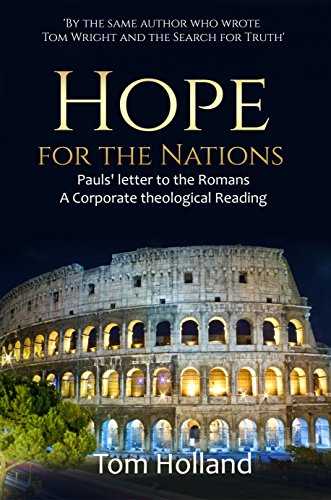A Book Review from Books At a Glance
by Mark Baker
I used to teach English grammar to middle schoolers. I found that a student could know a grammatical rule backwards and forwards and still accidentally break that rule when he wrote an essay. Somewhere in the transfer from textbook to writing, the concept got lost. We can do the same thing when it comes to theology. We are aware that Paul’s audience was corporate. The pronouns are predominantly plural which means that (where I come from) Paul would be saying “ya’ll” (plural), not “you” (singular). But when we transfer to analyzing Paul’s writings, sometimes we forget this point, and that is to our detriment.
Meet Tom Holland, Senior Research Fellow at Union School of Theology, Oxford. Holland has devoted over four decades to studying the corporate nature of Paul’s letters, particularly as it pertains to the Jewish Passover and the promises of a “second exodus.” Holland’s book Hope for the Nations serves as a tutor who patiently works through every part of your thinking, making sure that you are consistent with what you know to be true.
Hope for the Nations is a “corporate theological reading” of Paul’s letter to the Romans. It’s not necessarily a commentary because it does not focus on all the issues (authorship, dating, thorough grammatical and syntactical analysis, etc.). Rather, this work leaves no stone uncovered when it comes to the corporate nature of Paul’s letter to the Romans.
Consider just a few examples. First, drawing from Old Testament antecedents, Holland puts forth a broad understanding of “justification”—it is not primarily forensic (which lends itself to an individualistic interpretation) but also “covenantal” and “prophetic.” Yet he does not deny that the forensic element is present in justification. For example, Holland states that in Romans 3:28, Paul “uses the term ‘justified’ with its prophetic/covenantal meaning, rather than the forensic meaning with which it is so often credited. The framework of this Old Testament setting does not exclude the features of the forensic model (where God is seen acquitting his people as in a court of law) but goes beyond its restricted horizon” (90–1). Holland here explains broader, richer contours of justification that are often lost in overly individualized treatments of this passage, but he does so without an overzealous denial of the forensic nature of justification (those interested in a deeper treatment of justification in general may also want to consult Holland’s excellent work, Tom Wright and the Search for Truth).
Second, Holland states that Paul’s treatment of baptism in Romans 6 remains on the corporate level. When we think of baptism, we immediately think of individuals being baptized with water, but Romans 6 refers to neither the individual nor water. Rather, the focus is on the corporate body of Christ being united to Christ in his death and resurrection.
Third, Holland also reads Romans 9–11 through a corporate lens. For Holland, Paul does explain the election of individual believers, but that is not the focus of this important passage in Romans. Rather, Paul makes an important corporate statement: “unbelieving Israel in the new exodus model reflects Pharaoh in the Egyptian exodus, for both resist God and both have hardened hearts” (242).
There is much to glean from this book, even if the reader does not follow all of Holland’s conclusions. My biggest complaint about the book is not about the content but about the presentation. The type-setting, font, and cover design are not aesthetically pleasing and sometimes distract from the excellent theology contained in the book. As already noted, I’m a stickler for grammar, and there were several notable typos, including an apostrophe error on the front cover and a misspelling on the back cover. By way of the organization of the book, most of the commentary is strictly verse-by-verse. There were times when perhaps larger sections could have been covered to keep a more steady flow of the argument itself. Because Holland’s “reading” of Romans focuses on certain themes, when those themes were not central to the argument, sometimes the commentary felt rather pedestrian.
These complaints are minor compared to the treasure trove of insight and wisdom that is found in Hope for the Nations. For many readers, I suspect that reading this work will be paradigm-shifting and challenging, but it will be an introduction into a more faithful reading of Romans, a reading that will bear much fruit for those who are willing to see through a new lens.
Mark Baker (PhD, Southeastern Baptist Theological Seminary) is an elder at Christ Church and Dean of Faculty at Paideia Academy, both in Knoxville, TN.
Copyright 2020, Books at a Glance
Books At a Glance book summaries are available by subscription only and except for brief quotes may not be reproduced, in whole or in part, without express, written permission.
